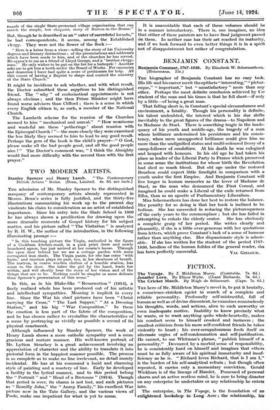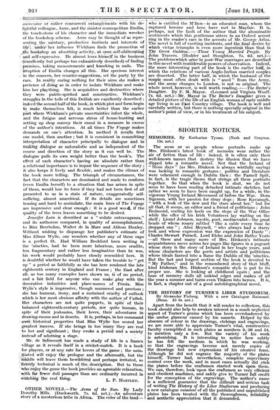FICTION.
The Voyage. BY J. Middleton Murry. (Constable. 7s. 6d.) Jennifer Lorn. By Elinor Wylie. (Grant Richards. 78. 6d.) The Cricket Match. By Hugh de Selincourt. (Cape. 7s. 6d.) THE hero of Mr. Middleton Murry's novel is, to put it brutally, a conscience-stricken egoist in search of a complete and reliable personality. Profoundly self;mistnistful, full of human as well as of divine discontent, henxamines remorselessly his thoughts, words, and actions, alive to each unworthy or even inadequate motive. Inability to know precisely what he wants, or to want anything quite whole-heartedly, makes his conduct seem to himself crooked and insincere ; the smallest criticism from his more self-confident friends he takes violently to heart ; his over-scrupulousness feeds itself on alternate orgies of self-condemnation and self-justification. He cannot, to use Whitman's phrase, "publish himself of a personality." _Devoured. by a morbid sense of responsibility, he is consistently hard on himself and imagines that others must be as fully aware of his spiritual immaturity and insuf- ficiency as -he is. "Richard loves Richard, that is I am I," is the burden of his self-analytical' refrain ; but though often repeated, it carries only a momentary conviction. Gerald Wickham is of the lineage of Hamlet. Possessed of personal charm and all active restless mind, he is sure to- bring disaster on any enterprise he undertakes or any relationship he enters into.
The enterprise, in The Voyage, is the foundation of an enlightened bookshop in Long Acre ; the relationship, his successive or rather concurrent entanglements with his de- lightful colleague, Anne, and the sinister cosmopolitan Emilia, the touch-stone of his character and the immediate wrecker of the bookshop scheme. Anne may be thought of as repre- senting the salutary, productive instincts and interests of life tuider,lher influence Wickham finds the promotion of bookshop an absorbing activity, at once self-obliteMting -':and selUexpressive. Ile almost loses-himself in the business_ ,(excellently but perhaps too exhaii,Itivelz,r described) of finding premises, taking measurements and ,knocking in nails. The r. irruption of Emilia changes all this. Her specious interest -; in the concern, her counter-suggestions, set the party by the cars. In reality caring nothing for their aims, she makes a pretence of d6ing so in order to isolate and make him her plaything. She is acquisitive and destructive where they were public-spirited and constructive. Wickham's strugglei in-the toils of this Delilah are expellently described ; indeed the second half of the book, in which plot and form begin tO Make themselves felt, is much better than the earlier Part where Wickham's private uncertainties infect the whole, and the fatigue and nervous stress of house-hunting and setting up shop convey their ennui in a measure in excess of the author's intentions. At all times The Voyage' makes demands on one's attention. In Method it recalls first;. one model, then another ; but it is consistent 'in"committing interpretation of character principally to dialogue and :in": making dialogue as naturalistic and as independent of the course and direction of the story as it can well be. The dialogue pulls its own weight better than the book's. The effect of each character's having an absolute rather than a relational importance is to inniair the sequence of the story ; it also keeps it lively and flexible, and makes the climax of the book more telling. The triumph of circumstances, the fact that the characters are dominated and made to conform (even Emilia herself) to a situation that has arisen in spite of them, would lose its force if they had not been first of all presented to us in a state of nature, exaggeratedly self- sufficing, almost anarchical. If its details are sometimes teasing and hard to assimilate, the main lines 'ofThe Voyage are impressive and clear enough : it is a good .wocd, if the quality of the trees leaves something to be desired. Jennifer Loin is described as a "sedate entravaganza," and its authoress compared,. in quality of accomplishment, to Max Beerbohm, Walter de in Mare and Aldous Huxley. Without wishing to disparage her publisher's estimate of Miss Elinor Wylie, one wonders 'whether any of these Caps is a perfect fit. Had William Beckford been writing in the 'nineties, had he been more laborious, more erudite, less fragmentary and rather less imaginative than he Was,- his work would probably have closely resembled hers. It is doubtful whether he would have taken the trouble to "get up" a period as faithfully as she has here rendered the late eighteenth century in Englaiid and France ; 'the East after, all, as too many examples have shown Us, ii of no period, and a fair field for anyone who can make ,play with the.' decorative industries and place-names of Persia. Miss Wylie's style is impressive, though mannered and precious; she has humour, irony, and a sustained cruelty of outlook which is her most obvious affinity with the author of Vathek. Her characters are not quite puppets, in Spite of their balanced eighteenth-century periods, nor. quite hiiman, in spite of their jealousies, their loves, their adventures in : draping-rooms and in deserts. It is, perhaps, in her command. ovek.Aistorie,a1 properties that Miss -Wylie • has scored her greatest 'Success. If she brings in too-Many •they are:real to her and significant ; they evoke a perad and a ao-ciety instead=of adorning a stage. Mr. de Selincourt has made a study of life in a Sussex village as it reveals itself in a cricket-match. It is a book for players, or at:any rate for lovers of the game ; the milli- : itiated will 'enjoy the prologue and the aftermath, but the 'Middle will leave them bewiklered and perhaps irritated, so fiercely technical is much of: the deseription. But to those Who enjoy the game the book -provides an agreeable relaxation, with far fewer dull passages than are ordinarily incurred in watching the real thing. L. P. HARTLEY.











































 Previous page
Previous page